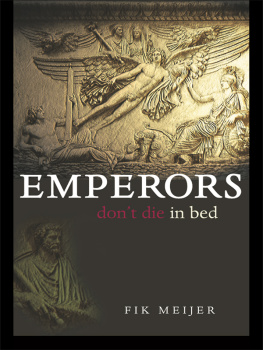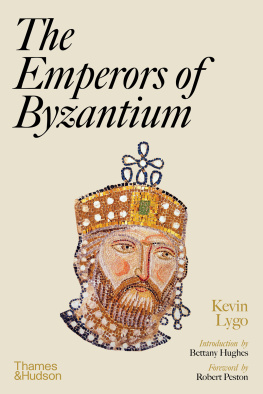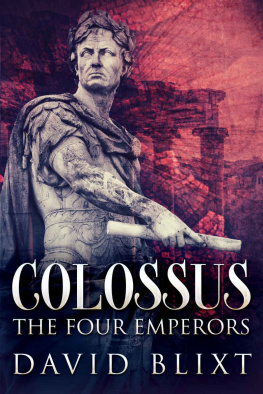Fik Meijer - Emperors Don’t Die in Bed
Here you can read online Fik Meijer - Emperors Don’t Die in Bed full text of the book (entire story) in english for free. Download pdf and epub, get meaning, cover and reviews about this ebook. year: 2011, publisher: Routledge, genre: Detective and thriller. Description of the work, (preface) as well as reviews are available. Best literature library LitArk.com created for fans of good reading and offers a wide selection of genres:
Romance novel
Science fiction
Adventure
Detective
Science
History
Home and family
Prose
Art
Politics
Computer
Non-fiction
Religion
Business
Children
Humor
Choose a favorite category and find really read worthwhile books. Enjoy immersion in the world of imagination, feel the emotions of the characters or learn something new for yourself, make an fascinating discovery.
- Book:Emperors Don’t Die in Bed
- Author:
- Publisher:Routledge
- Genre:
- Year:2011
- Rating:5 / 5
- Favourites:Add to favourites
- Your mark:
- 100
- 1
- 2
- 3
- 4
- 5
Emperors Don’t Die in Bed: summary, description and annotation
We offer to read an annotation, description, summary or preface (depends on what the author of the book "Emperors Don’t Die in Bed" wrote himself). If you haven't found the necessary information about the book — write in the comments, we will try to find it.
Emperors Don’t Die in Bed — read online for free the complete book (whole text) full work
Below is the text of the book, divided by pages. System saving the place of the last page read, allows you to conveniently read the book "Emperors Don’t Die in Bed" online for free, without having to search again every time where you left off. Put a bookmark, and you can go to the page where you finished reading at any time.
Font size:
Interval:
Bookmark:

Very few of the Roman emperors died a natural death. The insane Caligula was murdered after leaving the theatre; Caracalla while he was relieving himself. Caesar was stabbed twenty-three times and Otho was dragged into the Tiber with a flesh-hook. However great an emperors power, danger was ever present.
This fresh and engaging book looks at each of the Roman emperors from Julius Caesar in 44 BC to Romulus Augustulus in ad 476, illuminating not only the manner of their deaths but what their final days tell us about their lives. We also hear how the most powerful position in the history of the Western world held a permanent appeal, despite its perils, with eager candidates constantly coming forward to seize the throne.
Emperors Dont Die in Bed provides a clear history of the imperial succession as well as a compelling depiction of the intrigue and drama of Roman imperial politics.
Fik Meijer is Professor of Ancient History at the University of Amsterdam.
Translated by S.J. Leinbach

First published 2001
by Athenaeum-Polak & Van Gennep
Singel 262, NL-1016 AC Amsterdam
First published in English 2004
by Routledge
11 New Fetter Lane, London EC4P 4EE
Simultaneously published in the USA and Canada
by Routledge
29 West 35th Street, New York, NY 10001
Routledge is an imprint of the Taylor & Francis Group
This edition published in the Taylor & Francis e-Library, 2004.
Fik Meijer, 2001
Translation Routledge, 2004
This publication has been made possible with the financial support from the Foundation for the Production and Translation of Dutch Literature.
All rights reserved. No part of this book may be reprinted or reproduced or utilised in any form or by any electronic, mechanical, or other means, now known or hereafter invented, including photocopying and recording, or in any information storage or retrieval system, without permission in writing from the publishers.
British Library Cataloguing in Publication Data
A catalogue record for this book is available from the British Library
Library of Congress Cataloging in Publication Data
A Catalog record for this book has been requested
ISBN 0-203-47705-7 Master e-book ISBN
ISBN 0-203-33810-3 (Adobe eReader Format)
ISBN 0-415-31201-9 (hbk)
ISBN 0-415-31202-7 (pbk)
The history of the Roman Empire officially starts in 27 BC, but the history of Rome begins much earlier, in 753 BC. In that year, according to tradition, the twin brothers Romulus and Remus established a small settlement on the left bank of the Tiber. In seven centuries Rome grew from a city-state in central Italy to the dazzling centre of an immense empire. This growth began shortly after the city was founded. In the Regal Period (753509 BC) the small community on the Tiber developed into a real city, which would become the political, economic and cultural centre of the region. The long rule of the Etruscan kings unquestionably stimulated the urbanisation of Rome. It was they who drained and paved the low-lying, centrally located plain between the Capitol in the west, the Palatine in the south and the Quirinal in the north, thus creating the Forum Romanum, the political heart of Rome.
In 509 BC the last king, the Etruscan Tarquinius Superbus, was deposed by the Roman aristocrats, an event that marked the start of the Republic, a form of government that would endure for almost five centuries. The leadership was in the hands of the Senate, a governing body on which three to six hundred members of the most prominent families served. They made policy, which was then enforced by magistrates from their own ranks, with two annually elected consuls as the highest public officials. All citizens could cast their votes in two popular assemblies: the comitia tributa and the comitia centuriata. The democratic character of the two assemblies differed significantly. In the first, voting was done by district. The vote of every citizen, rich or poor, counted equally. It was here that the lower magistrates were elected: the aediles (responsible for public works) and the quaestors (supervisors of the states finances). However this assembly was not entirely independent, since peoples voting habits were regularly influenced by patronage ties to the elite and senatorial intimidation. In the comitia centuriata the population was divided into five classes based on wealth. The wealthier citizens were in the first class and furnished the majority of votes. In such a system the election of praetors (responsible for the administration of justice and authorised to lead armies) and consuls (entrusted with general civil and military authority) was a matter for well-to-do citizens. The poor inhabitants of Rome, who formed the overwhelming majority, played no role in this assembly.
During the Republic, the Romans steadily expanded their power. In the fifth and fourth centuries they had their hands full conquering Italy, a process that was completed around 270 BC. They then turned their attention to the Mediterranean world and conquered the countries bordering the Mediterranean Sea one by one. The Carthaginians and the potentates of the Greek-Hellenistic world in the east soon realised that the Romans could not be stopped. At the end of the first century BC, the Mediterranean Sea could justifiably be called mare nostrum (our sea). The Romans, however, were not satisfied with that and went to war with the Germanic tribes in central and western Europe as well. They too were made to learn that in the long run the Roman legions were invincible.
These great conquests led to a change in mentality among the elite. As a result senatorial solidarity, which had made Rome great, gave way to individualism. Increasingly consuls who had achieved stunning military successes began to act on the basis of self-interest, keen as they were on acquiring great personal power. The repercussions of this are not hard to guess. Internal rivalries began to emerge, leading to a power struggle that was fought out during the first century BC. Sulla and Marius, Pompey and Caesar, Antony and Octavian: these are the leading players in the civil wars of the dying Republic. After Caesar had paved the way for sole sovereignty as dictator for life, it was ultimately Octavian who dealt the Republic its death blow, by solemnly declaring himself princeps, first citizen of the state, in 27 BC. His reign was the beginning of the Principate, generally referred to as the Imperial Period.
In the history of the world there have been few rulers who had greater power and ruled over a vaster area than the Roman emperors. In the first two centuries of the Common Era they reigned from Britain in the west to the Euphrates in the east and from the Sahara in the south to the Rhine and the Danube in the north. They levied taxes and made life and death decisions. Most emperors had a solid power base: they were enormously wealthy, ensured of the support of the armies and constantly surrounded by large groups of flatterers who could read their every wish. Influential people who dared to plot against them or contradict them were putting their lives at risk. The people no longer played any significant role. The popular assemblies no longer met, and the only way the crowds could make their voice heard was by cheering for or booing the emperor during the circuses or gladiatorial matches.
Font size:
Interval:
Bookmark:
Similar books «Emperors Don’t Die in Bed»
Look at similar books to Emperors Don’t Die in Bed. We have selected literature similar in name and meaning in the hope of providing readers with more options to find new, interesting, not yet read works.
Discussion, reviews of the book Emperors Don’t Die in Bed and just readers' own opinions. Leave your comments, write what you think about the work, its meaning or the main characters. Specify what exactly you liked and what you didn't like, and why you think so.










